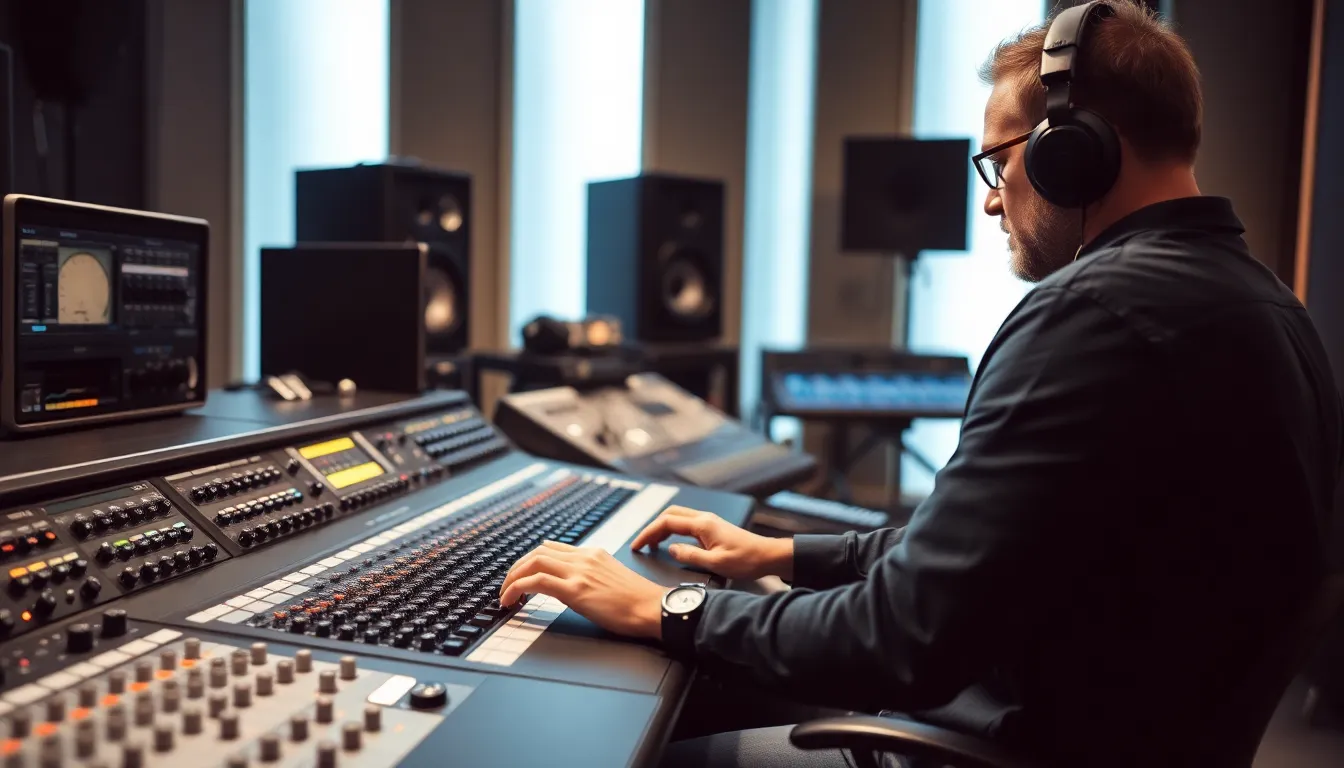In the world of music production, audio mastering is the unsung hero. It’s that magical process that takes a good track and turns it into a sonic masterpiece. Think of it as the final polish on a diamond—without it, your music might just sparkle, but with it, it’ll shine like a supernova.
Many people underestimate the importance of mastering, thinking they can just hit ‘export’ and call it a day. But let’s be real: nobody wants their carefully crafted tunes sounding like they were recorded in a tin can. With the right mastering, tracks can achieve clarity, balance, and that professional edge that makes listeners hit replay. So, buckle up as we dive into the art and science of audio mastering, where every note counts and every detail matters.
Table of Contents
ToggleWhat Is Audio Mastering?
Audio mastering serves as the final step in music production, ensuring tracks sound cohesive across various playback systems. This intricate process enhances audio quality, preparing songs for distribution.
Definition and Purpose
Audio mastering refers to the process of processing and preparing audio recordings for various formats. This step fine-tunes the overall sound by adjusting levels, applying equalization, and adding compression. The purpose is to create a polished final product that translates well to different listening environments. Mastering can also entail formatting tracks for specific platforms like streaming services or vinyl records. By achieving clarity and balance, mastering elevates a track, making it commercially viable.
The Importance of Audio Mastering
Audio mastering holds significant importance in music production. It ensures that tracks maintain a consistent sound quality when played on diverse systems. Mastering addresses frequency imbalances and dynamic range, preventing auditory issues. Skipping mastering can lead to tracks that sound incomplete or unprofessional, diminishing listener experience. Professionals use mastering to maximize loudness without sacrificing quality, achieving competitive sound levels. The art of mastering can transform a good track into an industry-ready release that meets listener expectations.
The Audio Mastering Process

Audio mastering represents the final touch in music production, refining tracks for distribution and ensuring quality across playback systems. This process demands a keen ear and precise techniques for stunning results.
Steps Involved in Mastering
Mastering encompasses several key steps. First, an engineer evaluates the mix to identify areas for enhancement. Next, adjustments in levels balance the sounds for coherence. Equalization follows, fine-tuning frequencies to achieve a more polished tone. Compression often reduces dynamic range, allowing for a louder track without distortion. Limiting caps the audio to prevent clipping, ensuring optimal loudness. Finally, preparing the audio for different formats solidifies the master, making it ready for various platforms.
Tools Used for Mastering
Tools play a vital role in the mastering process. A Digital Audio Workstation (DAW) serves as the foundation for editing and arranging tracks. Equalizers effectively shape sound across different frequencies, enhancing clarity. Compressors manage dynamic range, promoting consistency in volume. Limiters safeguard against distortion and ensure tracks maintain loudness. Additionally, monitoring speakers and headphones provide accurate sound representation, allowing engineers to make informed decisions. Relying on these tools transforms the mastering process into a comprehensive and efficient experience.
Common Audio Mastering Techniques
Audio mastering incorporates several essential techniques to enhance overall sound quality. Among these methods, equalization and frequency balancing play critical roles in ensuring a polished final product.
Equalization and Frequency Balancing
Equalization, often referred to as EQ, adjusts various frequencies within a mix. By boosting or cutting certain frequency ranges, a mastering engineer can achieve a balanced sound. These adjustments tailor the audio to suit different playback systems, addressing issues such as excessive bass or harsh treble. Frequency balancing ensures instruments and vocals coexist harmoniously, enhancing clarity and presence. This process not only enhances listenability but also prepares tracks for diverse formats like streaming services and vinyl.
Dynamic Range Compression
Dynamic range compression controls the variation between the loudest and softest parts of a track. It helps maintain an even level throughout the audio, preventing sudden volume spikes. A mastering engineer employs compression to enhance energy while preserving the track’s natural dynamics. Careful adjustments can result in a more polished sound that translates well across various playback devices. This technique enhances the listening experience, ensuring that the track maintains its impact without sacrificing quality. Proper use of dynamic range compression maximizes loudness without introducing unwanted artifacts, ultimately producing a professional final mix.
Choosing a Mastering Engineer
Selecting a mastering engineer significantly impacts the final sound quality of a track. Expertise and experience in the field are essential for achieving the desired results.
What to Look For
Focus on qualifications and a robust portfolio. Review samples of previous work to assess the engineer’s style and consistency. Expertise in various genres enhances adaptability in mastering diverse projects. Look for positive client testimonials, which speak to the engineer’s reliability and communication skills. Consider communication style as well; effective collaboration can enhance the mastering process.
Questions to Ask
Inquire about the engineer’s experience with similar projects. Asking about their mastering process can reveal their attention to detail and commitment. Confirm the equipment they use, as quality tools can produce superior results. Discuss turnaround times and ensure they align with your deadlines. Clarify revisions policy to understand how feedback is incorporated into the mastering process.
Mastering is an essential step in the music production process that shouldn’t be overlooked. It ensures a track’s sound quality is optimized for various listening environments. By fine-tuning levels and frequencies professionals create a cohesive and polished final product that resonates with listeners.
Choosing the right mastering engineer can make all the difference in achieving the desired sound. Their expertise can elevate a good track to an industry-ready release. Investing time in this crucial phase ultimately enhances the overall listening experience and sets the stage for a successful music career.




